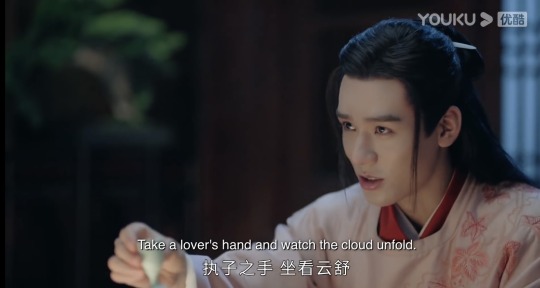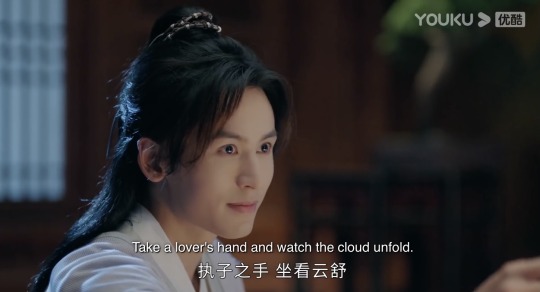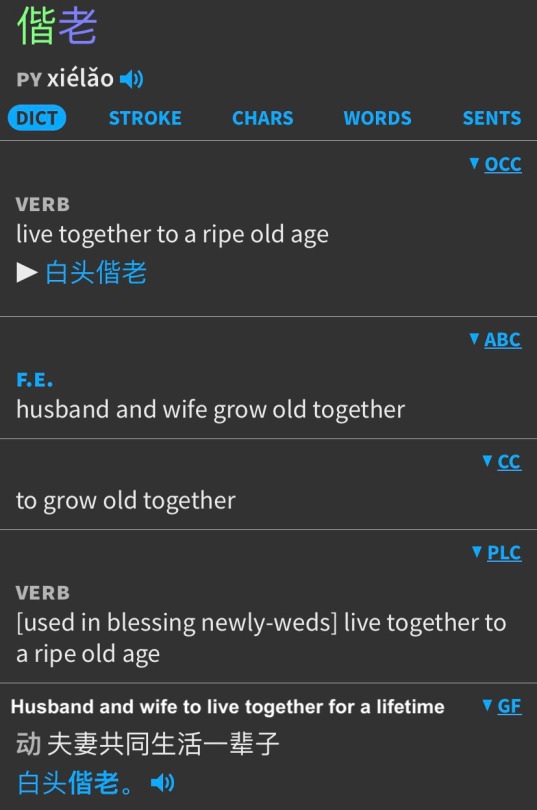#IM SO GLAD I SKIMMED THE GOOGLE TRANSLATE VERSION OF THAT ARTICLE adfalkdf the last bit is so funny
Explore tagged Tumblr posts
Text
lads I am feeling FRAGILE


With 执子之手, WKX is quoting 诗经·邶风·击鼓 (Book of Songs). The context:
死生契阔,与子成说 执子之手,与子偕老
No matter what happens, I made you a promise: To take your hand in mine, til death do us part [T/N under the cut, though I’d like to add here that in a modern context these lines seem to be ubiquitously taken as romantic. The original meaning is disputed whether it’s lovers or comrades-in-arms. At the end of the linked article, the author quips “some people may say there is an easy way to resolve this conflict...” (当然啦,我看到有人为了调和二者,认为“战友”就是“恋人”,“恋人”就是“战友”,提出了“基友情“的说法,这个嘛……)]
Some thoughts on this, mostly derived from this meta (in Chinese)
1. The second, unsaid half of the line is 与子偕老, which is more literally “grow old together”. In the face of ZZS’s mortality, with their time together feeling more measured by the day, WKX must feel that he dare not say these words out loud. YBY is allegedly coming with help, but WKX has already been disappointed once, on that night where it seemed like the sky and the heavens were crying with him as well. No cure is guaranteed - the only thing that is certain is ZZS in front of him now, happy and laughing and telling him that he has a home here. So, instead of alluding to promises neither of them can keep, WKX instead continues with 坐看云舒, saying that he’ll enjoy these days as they are, and appreciate the simple joys of life: lying back on the grass to watch the clouds unfold, his lover’s hand in his. (I really like how this parallels the “life is just three meals day” sentiment they toss back and forth throughout the show.)
2. This has to be taken in the context of the whole conversation on names they had. WKX is responding directly to ZZS’ initial toast, quoting how WKX explained his name back to him (天涯孤鸿 无根行客). This is WKX’s line with the characters for “Zishu” bolded: 执子之手,坐看云舒. I just think it’s neat that while 子 is literary “you”, it also emphasises that the “you” here is ZZS (unlike Youku with the “a” lover stuff*). Also, the second half rly gives the vibe of the Person A, looking at the stars: wow so beautiful / Person B, looking at Person A: yeah. [since it’s sit (坐) and watch (看) the clouds unfold (云舒)/Zishu (舒)]
*[More ramblings about Youku’s translation choices & general translation stuff under the cut]
For Youku to add “lover” in there is certainly... a choice. On one hand, the translator went ALL IN with making explicit the romantic connotations of the poem. On the other hand, generalising it to “a” lover makes it somewhat nonsensical and gives me vibes of “ah just two bachelors, staring into each other’s eyes across the table because they’re not gay, just waiting for young maidens to come sweep them off their feet”. Edit: I just realised the first time he says it in this scene Youku uses “the” instead, but IMO this is still very impersonal. It feels like he’s parroting a history book. This is the reason I completely missed even the “lover” bit the first time around bc i was like right theyre just quoting poetry again lmao
T/N: 1. 死生契阔 is literally “life and death, separated and reunited” (契阔=离合). 2. 偕老 might sound familiar if you kept up with shl concert shenanigans. Heizi laoshi said 祝贺他们白头偕老 and then everyone proceeded to collectively lose their minds. 3. I translated as “til death do us part” because “grow old together” just sounds so bland and I wanted to bring in the marriage connotations that 偕老 has. idk if it’s too much localisation though 😔
Biggest shoutout to Sabina on twitter!! their livetweets (in Korean) are where I initially learn about these things. the lines contain multitudes! tweet abt the scene in question
Some evidence for the solid romance/marriage connotations so yall know im not just pulling stuff out of my ass:

If you’re still here, I’m going to take advantage of the read more to keep rambling, so
I think this is a GREAT example of how translation is so contextual & dependent on interpretation (especially literary Chinese, which as my friend said, is a whole fuck). If we were going with the ~soldiers~ meaning of the poem, I’d translate it more like
No matter what happens, we swore an oath To go hand in hand, until the end
Although that discards the 老 aspect of it, which I’m not 100% on what the poet was trying to say with that ngl but I guess it could be like “we swore that we WOULD make it out of this battle to grow old together”. Which obviously doesn’t work with “until the end” because that’s so fatalistic, but brain zero cannot think of nice way to translate surviving
#word of honor#wenzhou#shan he ling#山河令#obligatory i am not native or fluent disclaimer feel free to point out any mistakes#look ik im quibbling over literally one word in yk's translatin but i just enjoy this ok#i swear i alwasy go into this expecting to jsut like translate sabina's tweet and then i fall down the rabbit hole of research and there's#just so much stuff and it's so interesting#and then i end up writing an entire essay#and go off on like five different tangents#***#IM SO GLAD I SKIMMED THE GOOGLE TRANSLATE VERSION OF THAT ARTICLE adfalkdf the last bit is so funny#i saw the google translated version which was#Of course I have seen someone who thinks that comrade-in-arms is comrade-in-arms and comrade-in-arms is comrade-in-arms#in order to reconcile the two.#and i was like this HAS to be gay and peeped the original#google was so confused with that one though did it just not parse the quotation marks properly#my god i cant keep reading this someone please let me know if there's a mistake or a typo sfsdlkfskf#shl:meta#shl meta
104 notes
·
View notes